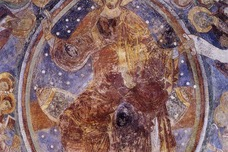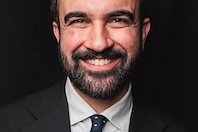Sunday Reflection with Fr Robin Gibbons - March 6th 2022

Second Temptation - Autun
First Sunday of Lent
Grim times, Ukraine and everything that is tied up with the enormity of what is going on becomes almost too much to listen to, let alone watch.
I have heard many pundits and pseudo politicians giving their penny's worth to anybody who will listen, but in the end perhaps what we can do is simple.
We are called to pray, but make sure our prayer is directed at the profound intercession needed for conversion of heart for those who are waging war, and for the consolation and redemption of the oppressed.
We need to involve ourselves in the practical aspects of care in whatever way we can for the refugees, and make sure we let the truth be heard that politics may engage in dialogue and that the religious leaders may speak out and act. But in this season we can certainly fast, not as an end in itself, but in its place as a valuable spiritual and physical tool.
The strict Eastern Christian tradition of refraining from meat, animal, fish and dairy products during Lent, is to show some form of thought for those animals and their well being; thinking about their needs for once. It is a kind of fasting-in-sympathy with creation-but it is also directed at what we really need to fast from, our tendency to let appetites rule us! Far more useful and perhaps important at this moment when we have so much 'faux' news, is another kind of fast and also abstinence: to refrain from gabbling words, ill thought out nonsense spouted freely, dangerous and sinful criticism of people, all that unnecessary gossip. To keep the fast of emotion and heart, sorting out, so to speak, what is necessary and good from what harms others and ourselves. It is an admonition to get back to real basics, as our second reading puts it:
'For one believes with the heart and so is justified, and one confesses with the mouth and so is saved'. (Rm 10: 10)
The 'Gospel of the Temptations' is a useful self-guide to see what exactly our heart and mind are like. We can examine what exactly it meant for Jesus, but this year I have taken another route, using it as a guide through my Lent to keep a check on what I am doing. It's a compass to keep me on the right route, encouraging me in trying to do the best I can. What I've done, and now share with you all, is to pull out the lovely dark and light comments in the narrative, like this: Before anything else, ask for the help of God. In this Gospel passage we learn that it is the Spirit we must call on for help. So I ask the Saviour to guide me with the help of the Holy Spirit, the Jesus prayer is a good way, but perhaps the Our Father even better. Then have a look at the story, the first temptation has these contrasts: the place for us is our own home, the immediate settings of life. We are bodily hungry for many things, into this comes anxiety and need, but we are reminded by Jesus that 'bread alone', getting what we want, does not bring satisfaction if we neglect the deeper needs of self or that of others. There has to be gratitude and love of neighbour as also of self and God.
The second temptation sets us in the context of our wider environment: power and glory are powerful tools in our hands, they breed these children, envy, greed, control, desire, above all power, it is there in all our institutions, uncontrolled it leads us to worship things we should not , but the antidote, the contrast is in a radical humility. Benedict in his Rule puts it succinctly as an activity where we shift our priorities and horizons in every circumstance (RSB ;4): Prefer nothing to the love of Christ. Jesus says it as it is: "It is written:
'You shall worship the Lord, your God, and him alone shall you serve.'"(Lk 4:8) Therein lies salvation's path, metanoia, the conversion of lives and values, but it can only be done with the help of God and the wise counsel of tried and tested spiritual guides.
We come now to the third temptation, perhaps the most insidious of all, that of testing the 'All Holy One' in the wrong way, treating the Triune One as though our faith is a magic conjuring trick, casting spells to right wrongs, making sure (and this is the insidious bit) that WE are alright. In fact it is also the sin of laziness, not using the intelligence granted to us to discover and see the mystery of a bound and crucified God utterly at our mercy, yes even now, and realising we are the disciples who are tasked with bringing the Good News to all! That is a radical and awful gift, but it has the happy outcome that it takes us to a point where we suddenly begin to comprehend we are in a real relationship with God, one that has begin here, and that will continue for ever. We don't go on testing the love of spouse or partner, friend or lover, we accept it in trust, otherwise it becomes a very odd kind of loving, and so Jesus points out to us: "It also says, 'You shall not put the Lord, your God, to the test.'(Lk 4:10)
Our God is not a snake oil seller, nor a conjurer, nor as some evangelists would have it, a daily miracle worker of a childish kind at our behest. No, you and I do not know God fully as yet, we have never seen the Holy One, but we do know the Christ in love and service, and in all we meet, friend and foe and stranger. He is there in the suffering, the mourners, the many, many, hungry, wounded people of life, and also let us never forget, through the Spirit in all creatures of life. And that is where we have to be, and that is why Ukraine has been a real wake up call to our complacency in Europe. For bad things do happen to good people, cruel things take place daily, done by humans to humans and to animals alike, but we have a free gift as children of the Most High, we can ask the Spirit and the Christ to help us change all that by the conversion of our lives!
Little Lectio Divina for Lent 1
From The Rule of Saint Benedict
Chapter 4 The Tools of Good Works part 1
1 First of all, love the Lord God with your whole heart, your whole soul and all your strength,
2 and love your neighbour as yourself (Matt 22:37-39; Mark 12:30-31; Luke 10:27).
3 Then the following: You are not to kill,
4 not to commit adultery;
5 you are not to steal
6 nor to covet (Rom 13:9);
7 you are not to bear false witness (Matt 19:18; Mark 10:19; Luke 18:20).
8 You must honour everyone (1 Pet 2:17),
9 and never do to another what you do not want done to yourself (Tob 4:16; Matt 7:12; Luke 6:31).
10 Renounce yourself in order to follow Christ (Matt 16:24; Luke 9:23);
11 discipline your body (1 Cor 9:27);
12 do not pamper yourself,
13 but love fasting.
14 You must relieve the lot of the poor,
15 clothe the naked,
16 visit the sick (Matt 25:36),
17 and bury the dead.
18 Go to help the troubled
19 and console the sorrowing.
20 Your way of acting should be different from the world's way;
21 the love of Christ must come before all else.
From Graham Greene's Monsignor Quixote
Monsignor Quixote encounters the Bishop.
"Have I ever in my life made a good confession? Has God pardoned me? Am I in a good or a bad state?" He was tempted to close the book but he read on. "I at once reply: God wishes to conceal all that from me, so that I may blindly abandon myself to His mercies. I do not wish to know what He does not wish to show me and I wish to proceed in the midst of whatever darkness He may plunge me into. It is His business to know the state of my progress, mine to occupy myself with Him alone. He will take care of all the rest; I leave it to Him."
Quote from Martin Scorsese's film: The Last Temptation of Christ, based on the novel by Nikos Kazantzakis.
"- Pontius Pilate: It's one thing to want to change the way people live... but you want to change how they think, how they feel.
- Jesus: All I'm saying is that change will happen with love, not with killing.
- Pontius Pilate: Either way, it's dangerous. It's against Rome. It's against the way the world is. And killing or loving, it's all the same. It simply doesn't matter how you want to change things. We don't want them changed."


















